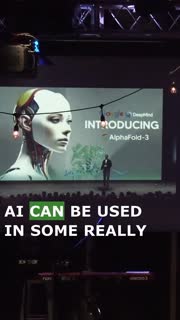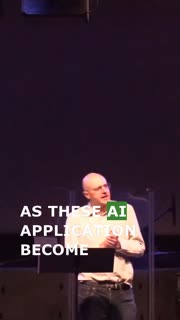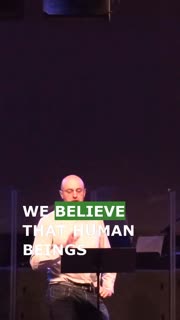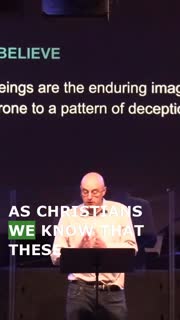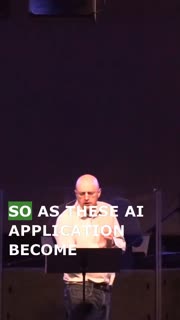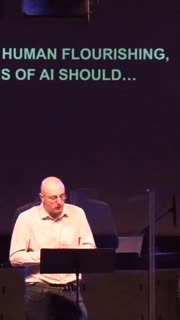Navigating AI: A Christ-Centered Perspective on Technology
Devotional
Sermon Summary
Bible Study Guide
Sermon Clips
### Quotes for Outreach
1. "AI can be used in some really cool ways, really amazing ways, that can enhance human flourishing and that I think we should all be genuinely excited about. And there's lots of examples of this, and I'm just going to share one. So this newest version of AlphaFold, called AlphaFold 3, was just launched by Google Deep Mind just a few weeks ago on May 20th. And this is a really cool breakthrough. Basically in the latest version, with an import. The input of a DNA sequence, the AlphaFold 3 can predict the three-dimensional structure of the protein that it codes for, but not just the structure, but it can also figure out the function of that protein and what elements it's going to interact with and what it's not going to interact with." [07:40] (48 seconds)
2. "I think we need to be aware that there's a real risk, especially for young people, for senior citizens or just people struggling with loneliness that it could become increasingly tempting to replace real human connections with artificial relationships. And we're already seeing massive amounts of funding going into companies that are working on creating AI companions, AI girlfriends, AI boyfriends. And for many people, you know, this might feel like a preferable or easier alternative to making real human connections." [16:25] (39 seconds)
3. "As these AI applications become more mainstream, I think there are going to be some really profound questions that people are going to be increasingly wrestling with like, what does it even mean to be human? What is even real and what's authentic? Like what applications of AI should we be excited about and embracing and which ones should we be pushing back against?" [17:38] (27 seconds)
4. "We believe that human beings are the enduring image of God. So we believe that human beings, for the duration of the human story, will uniquely remain entrusted with bearing the image of God. You know, AI may be able to mimic our behavior or the creative output of human beings, but at the end of the day, it is only an echo of us. Human beings remain precious, beyond all measure, and are irreplaceable, regardless of our output, or our accomplishments, or our efficiency." [20:23] (36 seconds)
5. "As Christians, we know that these kinds of things can give us some measure of satisfaction in the short term but we also know that these at the end of the day are idols and they won't fulfill us and ultimately what will fulfill us is relationship first and foremost relationship with God but also relationship with family, with friends, with our community that is what we are wired for." [21:08] (27 seconds)
### Quotes for Members
1. "So, I had a chance to do a sermon at the river. It was my very first one. The beginning of the year about science and faith. Were any of you there for that one? All right. So, I talked about awe and wonder, the Big Bang, expansion of the universe, all that kind of stuff. So, if you were one of those people who thought that talk was a little bit, like, out there, we're taking it to a whole new level today. So, get ready. Are you with me on that?" [00:57] (31 seconds)
2. "So, really, I have two main objectives today. The first is to help everyone be aware of what's happening in AI. And the second is to help people understand what's happening in AI. And what may be coming so we can better equip ourselves and our families. And there is actually a lot that's coming. And the second is really to share a Christ-centered framework on AI that really can provide an initial basis for how to think about and how to engage with this technology as it gets more widespread." [01:58] (31 seconds)
3. "So as these AI applications become more mainstream, I think there are going to be some really profound questions that people are going to be increasingly wrestling with like, what does it even mean to be human? What is even real and what's authentic? Like what applications of AI should we be excited about and embracing and which ones should we be pushing back against? And I actually think as these types of questions come up more and more, the church has a really unique opportunity because people with a secular worldview, I really believe are gonna struggle to answer these types of deep questions in a compelling way. But as Christians, I think we actually have some very compelling answers and a perspective that can provide encouragement and hope and a degree of moral clarity as well." [17:38] (27 seconds)
4. "So going back to this Christian entrepreneur gathering I went to, there was this initial framework developed around how to think about and how to approach AI that I think is a really helpful starting point for us to consider. This was put together by Christian tech leaders in AI as well as some pastors and theologians. Andy Crouch, who some of you may be aware of, he's the author of the TechWise family and was a former managing, editing director of Christianity Today, was part of that team. And he synthesized the thinking into an overall thesis." [18:55] (39 seconds)
5. "So the first is, you know, AI applications that really advance human flourishing ultimately should inform but not replace human agency. And, you know, this can span a lot of different areas, but for example, tools that we can use to help us create and fulfill their artistic vision, I think, are wonderful things, rather than, you know, AI applications that are really designed to just replace the artist. Or applications that can inform doctors and patients with better information so they can make better decisions about healthcare, I think is a beautiful thing. Or tools that can help inform leaders and leadership teams so they can make better decisions for their organization. Now these are tools that can inform, but they don't replace the human, in the middle." [24:09] (64 seconds)
Ask a question about this sermon
1. "AI can be used in some really cool ways, really amazing ways, that can enhance human flourishing and that I think we should all be genuinely excited about. And there's lots of examples of this, and I'm just going to share one. So this newest version of AlphaFold, called AlphaFold 3, was just launched by Google Deep Mind just a few weeks ago on May 20th. And this is a really cool breakthrough. Basically in the latest version, with an import. The input of a DNA sequence, the AlphaFold 3 can predict the three-dimensional structure of the protein that it codes for, but not just the structure, but it can also figure out the function of that protein and what elements it's going to interact with and what it's not going to interact with." [07:40] (48 seconds)
2. "I think we need to be aware that there's a real risk, especially for young people, for senior citizens or just people struggling with loneliness that it could become increasingly tempting to replace real human connections with artificial relationships. And we're already seeing massive amounts of funding going into companies that are working on creating AI companions, AI girlfriends, AI boyfriends. And for many people, you know, this might feel like a preferable or easier alternative to making real human connections." [16:25] (39 seconds)
3. "As these AI applications become more mainstream, I think there are going to be some really profound questions that people are going to be increasingly wrestling with like, what does it even mean to be human? What is even real and what's authentic? Like what applications of AI should we be excited about and embracing and which ones should we be pushing back against?" [17:38] (27 seconds)
4. "We believe that human beings are the enduring image of God. So we believe that human beings, for the duration of the human story, will uniquely remain entrusted with bearing the image of God. You know, AI may be able to mimic our behavior or the creative output of human beings, but at the end of the day, it is only an echo of us. Human beings remain precious, beyond all measure, and are irreplaceable, regardless of our output, or our accomplishments, or our efficiency." [20:23] (36 seconds)
5. "As Christians, we know that these kinds of things can give us some measure of satisfaction in the short term but we also know that these at the end of the day are idols and they won't fulfill us and ultimately what will fulfill us is relationship first and foremost relationship with God but also relationship with family, with friends, with our community that is what we are wired for." [21:08] (27 seconds)
### Quotes for Members
1. "So, I had a chance to do a sermon at the river. It was my very first one. The beginning of the year about science and faith. Were any of you there for that one? All right. So, I talked about awe and wonder, the Big Bang, expansion of the universe, all that kind of stuff. So, if you were one of those people who thought that talk was a little bit, like, out there, we're taking it to a whole new level today. So, get ready. Are you with me on that?" [00:57] (31 seconds)
2. "So, really, I have two main objectives today. The first is to help everyone be aware of what's happening in AI. And the second is to help people understand what's happening in AI. And what may be coming so we can better equip ourselves and our families. And there is actually a lot that's coming. And the second is really to share a Christ-centered framework on AI that really can provide an initial basis for how to think about and how to engage with this technology as it gets more widespread." [01:58] (31 seconds)
3. "So as these AI applications become more mainstream, I think there are going to be some really profound questions that people are going to be increasingly wrestling with like, what does it even mean to be human? What is even real and what's authentic? Like what applications of AI should we be excited about and embracing and which ones should we be pushing back against? And I actually think as these types of questions come up more and more, the church has a really unique opportunity because people with a secular worldview, I really believe are gonna struggle to answer these types of deep questions in a compelling way. But as Christians, I think we actually have some very compelling answers and a perspective that can provide encouragement and hope and a degree of moral clarity as well." [17:38] (27 seconds)
4. "So going back to this Christian entrepreneur gathering I went to, there was this initial framework developed around how to think about and how to approach AI that I think is a really helpful starting point for us to consider. This was put together by Christian tech leaders in AI as well as some pastors and theologians. Andy Crouch, who some of you may be aware of, he's the author of the TechWise family and was a former managing, editing director of Christianity Today, was part of that team. And he synthesized the thinking into an overall thesis." [18:55] (39 seconds)
5. "So the first is, you know, AI applications that really advance human flourishing ultimately should inform but not replace human agency. And, you know, this can span a lot of different areas, but for example, tools that we can use to help us create and fulfill their artistic vision, I think, are wonderful things, rather than, you know, AI applications that are really designed to just replace the artist. Or applications that can inform doctors and patients with better information so they can make better decisions about healthcare, I think is a beautiful thing. Or tools that can help inform leaders and leadership teams so they can make better decisions for their organization. Now these are tools that can inform, but they don't replace the human, in the middle." [24:09] (64 seconds)
